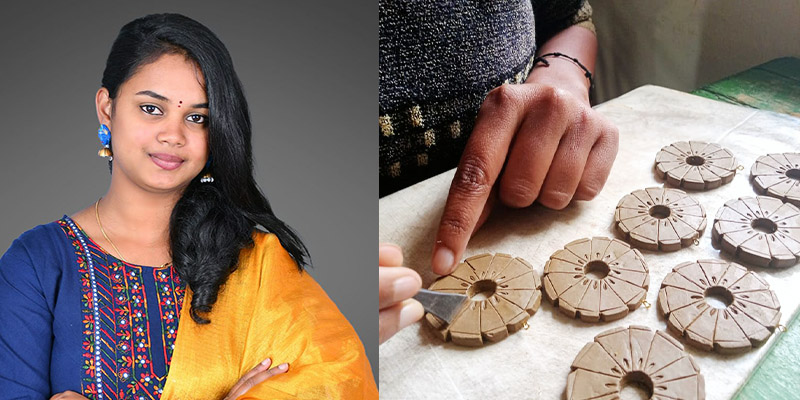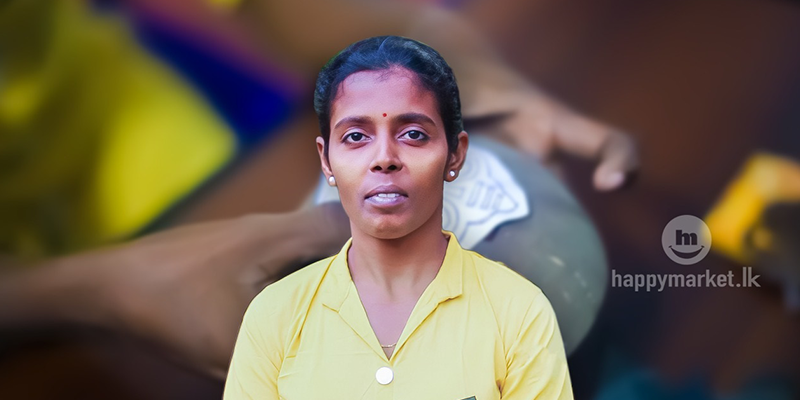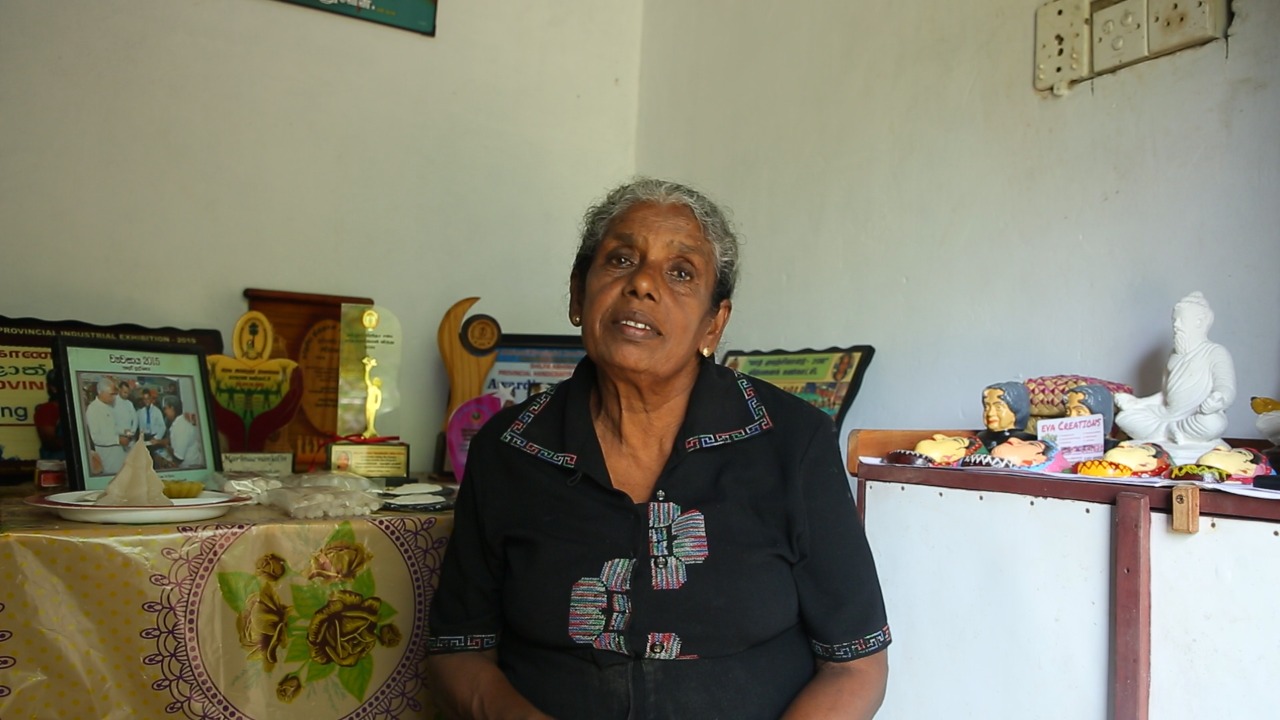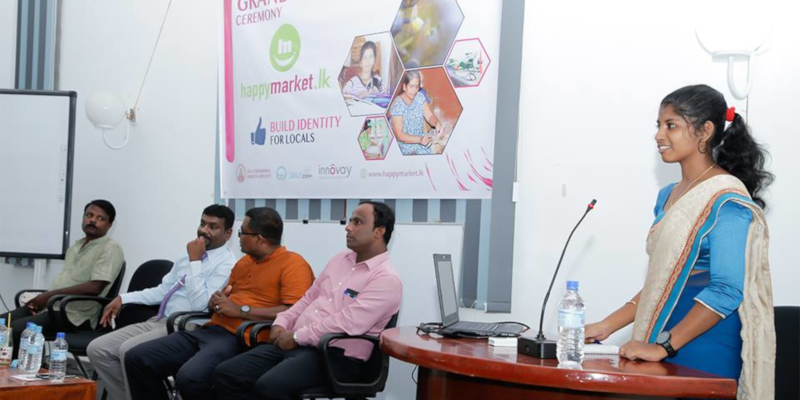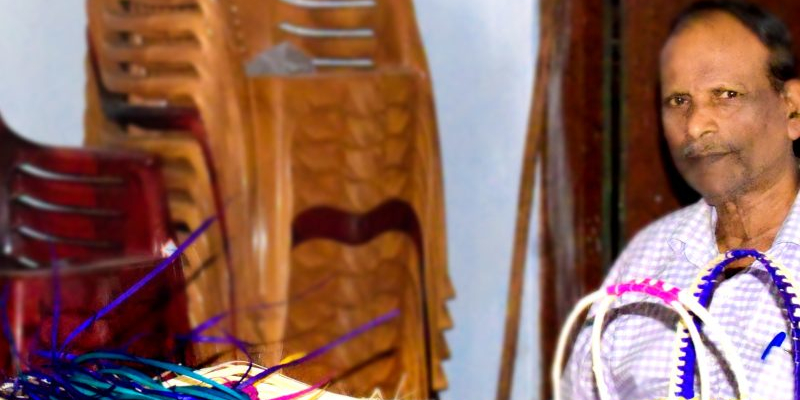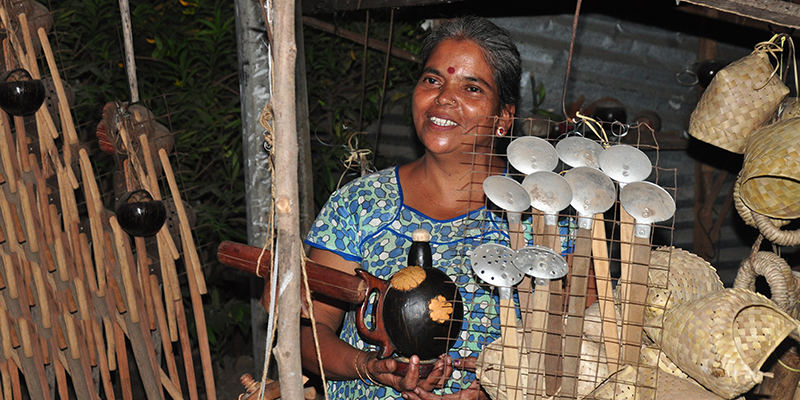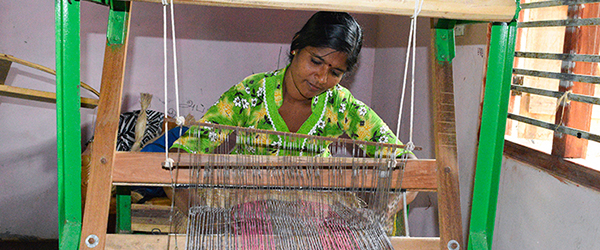YAZ CREATION
Introduction
Terracotta jewelry is a type of handmade jewelry that is made from baked clay. It is known for its earthy and rustic look and often features intricate designs and patterns. Terracotta jewelry is popular in many parts of the world, including India, Bangladesh, and Nepal, where it is often worn for cultural and religious events. In that respect, Yazhini Ravichandrakumar has started this handmade creative jewelry collection.
Uniqueness of creativity

The jewelry is usually lightweight and affordable, making it a popular choice for everyday wear as well. Terracotta jewelry can come in a variety of forms, including necklaces, earrings, bracelets, and rings, and can be found in a range of colors, from natural earth tones to vibrant hues.
Different mechanisms in society give recognition to those who have space for advancement in society. Thus, Yazhini Ravichandrakumar did not follow the path followed by everyone else but made a mark on her path.
Yazhini as an inspirational Women
Many countries have developed various productions. , If the young men and women of our country have different ideas, Yazhini can be taken as an example that different changes occur to bring a path for development. Also, She has managed both the family burden and her business in a balanced way during the Corona period. This scenario indicates her endurance and passion.

She follows the success stories of women like Nidhi Jain and Farhana Rahman in India and Bangladesh respectively, and are inspiring examples of how women can turn their passion for handmade jewelry into successful entrepreneurial ventures. Overall, the terracotta jewelry industry provides an opportunity for Yazhini to showcase her talents and creativity while also building a successful business.
SD HAND MADE CRAFTS
Introduction
Sasikumar Dina is a very clever and energetic creative woman. She has three children. She started her business in 2019. Although her husband worked in the marine industry, he has also engaged himself in this craft business as her partner. Through 10 days of training, she gained knowledge about the production of coconut shell type of products. During his training period, she had a keen interest in it. and While making things in training, she got many new ideas to create new innovative products.
The Pradeshiya Sabha is increasingly encouraging her and providing all assistance. She avoids plastic products and instead produces eco-friendly products. Over time, customers also gave many suggestions for new products. With the help of government funds, the Department of Industries provided many assistants for marketing, machinery, and tools through the district secretary.
Marketing and extent of her business
For the first time, she got the New Year market opportunity to market their products by the arrangement of DS. It was then that she began to realize the demand and value of her production. Foreign contacts began to increase day by day as did domestic market opportunities. What started as a hobby and part-time business has now grown to the point where he earns his entire family’s income.

Challenges and future
Covid.19, lack of places and tools, and despite some social problems, she continues to do her work with huge involvement. Even though many dismiss it as a difficult profession, he works tirelessly without giving up.Her future aim is to further improve her business and build it into a big company and give jobs to many women. Although initially it have an income of 1000 rupees, now it is possible to earn many times the income by her.

SEMMAL PRODUCTION
Introduction
Pushpamala is one of the enthusiastic women who have a huge interest in entrepreneurship. She breaks all the barriers that build by society for all women. Also, she is unique in his way of creativity. She began to carry the family burden on her head as a volunteer teacher due to the disappearance of her husband during the 2009 war situation.
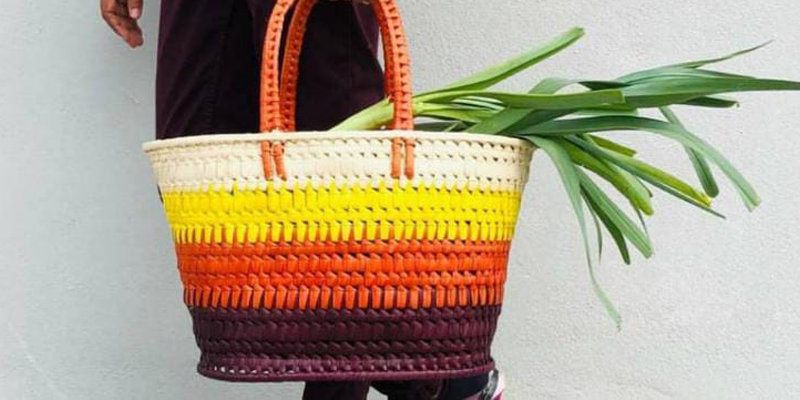
Her carrier path
She started this business as a home-based business as she could not continue her career as a teacher with a child. No matter how she started, her commitment, hard work, and dedication to the business over the past 5 years have made progress. Her business journey with individuality and initiative runs with strength and inspiration even in today’s economic situation of the country.
May the path ahead be paved with flowers?
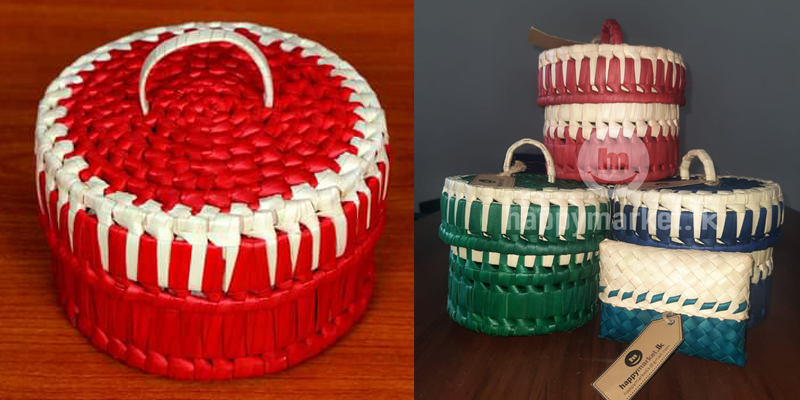
The demand for her handcrafted products from abroad has also increased due to making the best quality products. But She says that there are difficulties in increasing the number of products due to raising the products by hand without any mechanical or machinery help or other facilities. She has manufactured and marketed several products by using palmyra leaves. Such as boxes, flowers, baskets, Lunch boxes, etc. She has also been providing related handcrafted training to many people across the country.
There are ten people are employed in her business, which is operating in chavakacheri under the name SEMMAL. She has also received many provincial and district awards for her handicrafts. And she is trying to create new products to achieve a national award. It is an example to all that a single woman without even a companion husband partner or family has been honored as an outstanding entrepreneur. It gives a sense of inspiration and confidence to all women who are struggling in their careers.
RIYA CREATION
Introduction
There is a beautiful village that has amazing personalities and resources.In that peaceful village has a young enthusiastic women named priyanka.
Priyanka has made her mark in the industrial sector through her creative ideas. she started her business amid many struggles and has been working tirelessly to date. Even though she could not enter the university, she chose industry as her right path.
Success path of priyanka’s business
Small initiative will change one day big success. It is very true in Priyanka’s story .The business that started with 100rupees has now grown manifold. Through that, she participates in the family economy. She makes various handicrafts like chocolate boxes, birthday card quilling dolls, frames, etc. Without anyone’s help, she saved her own money and bought a paper-cutting machine.
she promotes her product through the appropriate use of social media mainly on Facebook. Through productive research, She learns many new designs and makes new products with clarity and attractiveness.

Toward Priyanka’s dream
Every woman has different kinds of dreams in their passion. Priyanka is also a dreamer who has a dream throughout her career path.
Her dream is to make wedding cards by hand and distribute them at a low cost. Her card should be equal to or more than that of the printed cards. As well as she wishes to turn Riya Creation into a brand. Hope that Her dream will come true one day. Moreover, Her parents provide great support and advice to her.

EVA CREATION
The life diary of Mrs .Alosious Marina
Mrs .Alosious Marina, 68 years old woman she lives in chavakacheri,her smile is her logo , her personality is her business card and the way her make others feel is her trademark.
May the path ahead be paved with flowers..
In 2013 a woman took an initiative to take care of her family. That effort is called EVA creation. Initially, she started this business to carry the family burden and take care of her children, then that spark ignites her to succeed in the world. She has been making handicrafts(statues, paperwork cards, and home decorative items) with her own hands and each item is unique because she is a creator. In the beginning, her handicrafts were only shown to the market through fairs, then the people who came to the fairs got attracted to the goods, so the handicrafts were exported to other countries, and her business grew gradually during that time.
BUSTING THE SALES BARRIER FOR SMALL ENTREPRENEURS
If your objective is to make money you’d better be sure you know how to sell. If you need to feed and house and educate your family. Or you need to impress your colleagues with the latest baubles, gadgets and fancy cars. Whether you are coding apps, handmaking ornaments, cultivating mangoes, or stealing bicycles. If your objective is to make money you’d better be sure you can sell what you make.
There is a thriving Worldwide industry providing equipment and training to poor people. People who have few options but to take what is given. Generally free, often with NGO or Diaspora funding, these programmes desire to help the poor make a living. Very laudable. In my time in Jaffna I have met and observed and heard charitable programmes who donate sewing machines, cows, skills training in IT and English and Entrepreneurship etc. Most are proudly “Non Profit”. Which is quite frankly what many of them deliver to the poor people – No Profit.
I have met donors complain that they return after a few months to the recipients of their charity only to find the training has been forgotten and the donated sewing machine or cow or whatever has been sold. Condemning the ingratitude, dishonesty and laziness, they blame the poor for their own poverty.
These programmes frequently fail because they don’t solve the problem of selling. Training is easy. A few hours of lectures, some sweet tea and vaddai, rounded off with a certificate awarding ceremony is easy. Particularly easy if nothing meaningful is done a year later to see if the training actually made a difference. Donating equipment is even easier. Turn up with the kit, hand it over, and take the photographs for the website. Don’t get me wrong, if these gifts of skills and kit are combined with a route to market and earning money they are wonderful. But they generally aren’t.
Selling is hard. You have to understand what the market wants, how to evolve your products and services to make and meet market needs, how much the market will pay, how to let the market know you exist, how to get the market to trust you, how to take payment, how to deliver your products and services, how to deal with questions and complaints, how to hold your customer base for repeat business, and so much more. For small businesses you know if your selling is successful by how much money you make and whether the debt collector is looking for you.
Selling skills become powerful with time and experience. Not from YouTube and Powerpoint and “roadmaps” and vaddai and sweet tea and certificates.
HappyMarket.lk is a new initiative borne in Jaffna that aims to take responsibility for selling. An initiative headed by Mr.Robinson B Prashanthan, a Jaffna entrepreneur whose businesses run from IT to environmentally friendly crockery (made from parts of the areca palm). I have met Prashanthan to say hello every now and then over the last couple of years, but never got to know him. This changed early in 2019 when Prashanthan showed me his areca plate factory in Visvamadu Killinochchi, and when I visited his software offices in Jaffna Town.
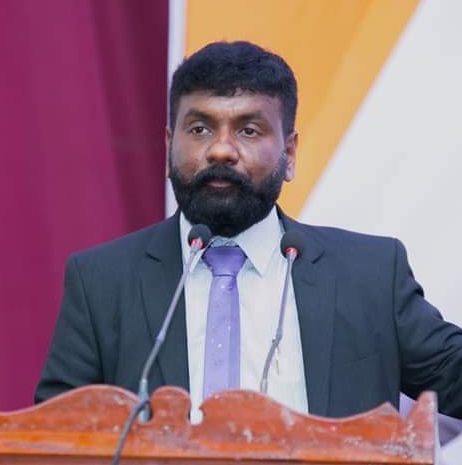
In our conversations I found Prashanthan’s approach matches my own:
a) Profit Is nothing to be ashamed of. Make a good profit by giving a good deal to your customers, your suppliers, and your staff. What you then do with your profit is up to you. Eat it, wear it, drive it, reinvest it, that’s your business.
b) The key need of today particularly in the North and East is to create successful businesses which will create good jobs, grow the economy and bring prosperity. We need to build businesses that provide examples for other businesses and investors to follow.
c) The time has come to support the most promising to succeed, not only help the weakest to survive.
To quote South Africa’s former Archbishop Desmond Tutu, one of that country’s leading anti-apartheid campaigners, “There comes a time when we need to stop just pulling people out of the river. We need to go upstream and find out why they are falling in”.
We decided to do this article to mark the launch of HappyMarket.lk on 26th April 2019. Starting with just a few products, HappyMarket will grow over the coming months and years. Prashanthan has interduce Miss Thuvaraka Krishnamoorthy as the founder & CEO for HappyMarket. 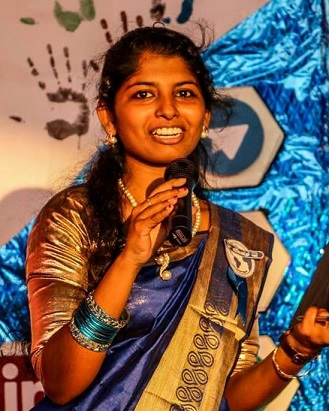
HappyMarket provides a marketplace for micro and small businesses. But not for all of them. HappyMarket only allows selected suppliers to offer specific products and services.
The reason for this selection is HappyMarket provides much more than a marketplace. HappyMarket identifies businesses with the strength and potential to become great. HappyMarket provides mentoring and feedback for the businesses to develop their products, obtain certifications (e.g. organic, health, etc), improve their quality from manufacturing to packaging and branding. HappyMarket will identify business opportunities, and help provide samples of products to potential customers. For example, HappyMarket took samples of woven baskets to a leading tea brand pitching the idea of using the baskets as boxes for premium teas.
HappyMarket ensures its website retains a high profile by continuous Search Engine Optimisation (SEO). HappyMarket provides an online payment gateway to take immediate payment when an order is taken from its website. And HappyMarket takes a direct role in ensuring products are successfully delivered to customers Worldwide.
For this service, HappyMarket puts a 20%-30% mark-up on the products it sells. This covers third party costs such the online payment processing fees. The producers pay no other charges to HappyMarket except this “success fee” on actual sales. The producers make no up-front payments.
HappyMarket uses this income to invest in the support, maintenance and development of its online marketplace. It spends on marketing costs, certification, brand development etc. And providing advice and support to the entrepreneurs who have joined the market. And yes, when the time comes it will make some profit.
Prashanthan commented that Northern entrepreneurs have many issues to overcome. One of these is product quality. During 30 years of war, many people in the North didn’t worry too much about the quality of their possessions. What was the point when they may have to abandon them at any moment due to the fighting. So long as a chair didn’t collapse when you sat on it, it didn’t matter if it wobbled. Craftsmen left the region to flee the war, so their craft wasn’t passed on to the next generations. Quality became of secondary importance. Such imperfections maybe acceptable to consumers surviving in a war zone. But in times of peace they are the mark of shoddy careless workmanship. Even ten years after the end of the war, many businesses in the North still have not worked out how to judge what modern markets require and what new opportunities exist.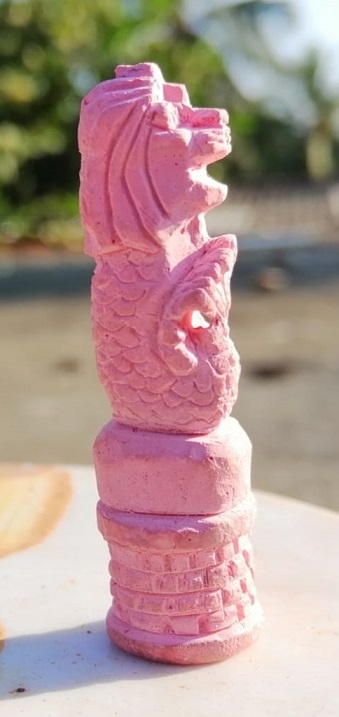
Prashanthan told me of an old lady in Neervaly who makes hats from banana fibre. It takes her two days to make a small hat which she can sell for Rs300, earning her a meagre Rs150 per day. In Cambodia he saw the same weaving skills being used to produce boxes for bottles of premium alcohol, earning the artisan a decent wage. I myself met a young woman from Delft Island at a market in the Jaffna Kachcheri. She makes animals from seashells. She sold me a seashell peacock for Rs250. When I asked she said it took her more than a day to make. Even though the ornament was pretty unlovely, it showed her skill and dexterity which could be put to much more productive and profitable uses.
As part of my visit HappyMarket’s CEO, Thuvaraka, had arranged for me to meet three producers with examples of their work. All three are artists, producing work demonstrating what to me is miraculous skill and talent. However, in my opinion, they use their amazing skills to make products that have very limited commercial value. HappyMarket by providing them with support and exposing them to new ideas hopes to turn their promising abilities into the source of good livelihoods.
Mr.Indrasekara Thanuwaran, 28 years old, lives with his parents and one brother. Having attended the prestigious Jaffna Central College, he went on to do an HND diploma in IT. He earns a living as a freelance website and software developer for online businesses. His real passion is making wooden models of ships and planes. Using toothpicks and ice-cream sticks, Indrasekara’s models are a few inches in size. Despite their tiny size, the models have moving parts. The model of the ship below is approximately the length of one toothpick, which can be seen on its side. Indrasekara also carves statues out of sticks of chalk (the sort used by school teachers at the blackboard).
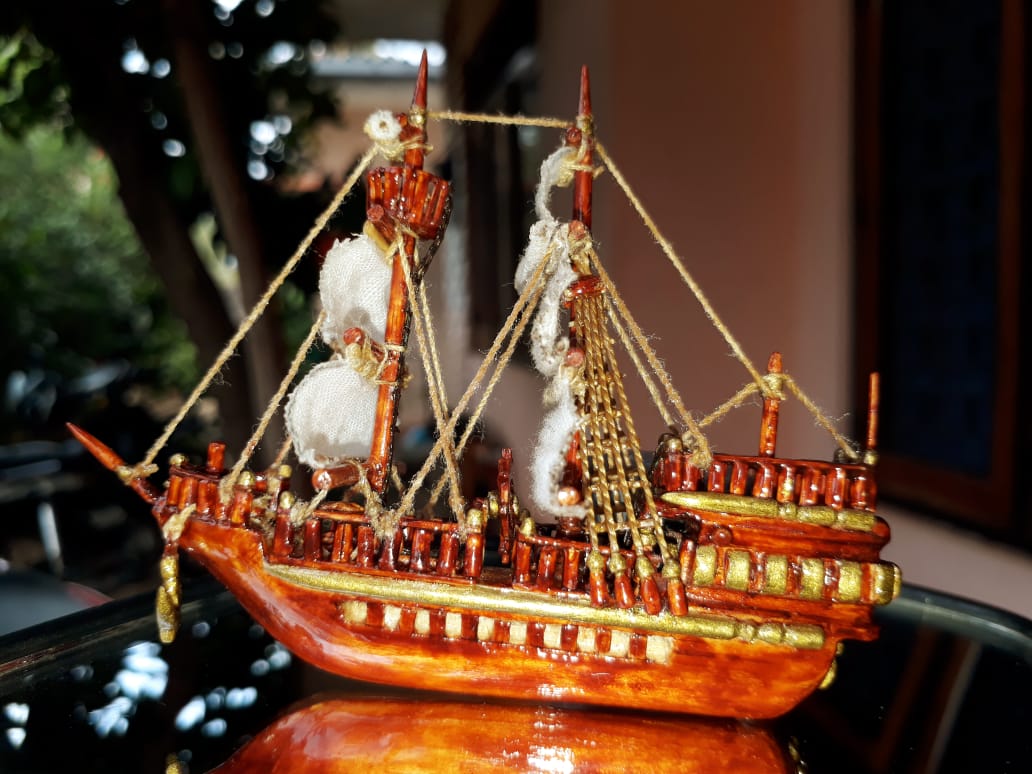
David and Shalomi Kanakaratnam, both 28 years old and recently married, live in Manipay. He works in a hardware shop while she has taught at a Montessori school and gives English language tuition for Grade 5 students. Together they produce wood burning art (pyrography). David’s most amazing skill, in my opinion, is his ability to carve figurines in a single pencil lead. They would like to open a shop to sell their art, but are worried at taking on the commitment of renting a premises, paying the electricity and water bills, and still making enough to live on.
HappyMarket offers a great opportunity for these young people. An opportunity to develop their skills and products to be attractive to an international market. An opportunity to sell their products risk free through the HappyMarket website. And the opportunity to network with other artists, customers, and even people like me who can offer new ideas and suggestions.
A couple of years ago I came across these 3D cards by the UK company Cardology at a household exhibition in London. The cards are designed by one of the proprietors, who is an engineer and can ensure the 3D structures open and close smoothly and are robust. They get the components of their cards laser printed, and then have them assembled in Thailand. These cards sell for around Rs2,000/=, equivalent to £9. Less time and effort than it takes to make a seashell peacock and for 8 times the price!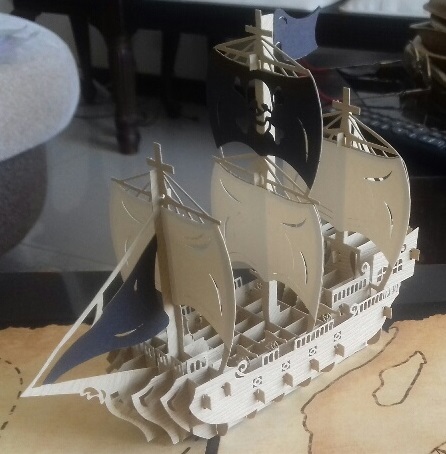
There will be people who visit HappyMarket whose vision enables them to see beyond the products on sale. They will see the raw skills and the materials that HappyMarket showcases. They may see new opportunities for the design and the dexterity skills. They may see novel uses for the materials, the banana fibres, the woods, stones, ceramics, shells and fabrics. They may see opportunities in the HappyMarket network, from supplier to customer, to offer completely new products and services. HappyMarket is far more than just a shop selling products.
Prashanthan is keen to partner with other organisations and people. Already, before launching HappyMarket, he has partnered with the Jaffna NGO Council. He isn’t particularly looking for cash investment. He is looking to widen his network to provide more routes to market, and to make links with other producers who may subcontract to HappyMarket suppliers. He is looking for endorsements from happy customers and organisations who have seen what HappyMarket is doing, and by their endorsements will build up HappyMarket’s visibility and credibility.
HappyMarket is a partner for organisations providing training and equipment, who want their beneficiaries to be able to take their goods and services to market. And earn money for their livelihoods.
While HappyMarket is starting in the Northern Province, Prashanthan will in due course open it to small entrepreneurs across Sri Lanka. He wants it to become a powerful channel for small businesses in Sri Lanka to earn their livings. Bridging the gap to market that hinders small entrepreneurs from successful selling.
Robinson B Prashanthan can be contacted at rb@innovay.com. Thuvaraka Krishnamoorthy can be contacted at happymarketlk@gmail.com
( — The writer Jekhan Aruliah was born in Sri Lanka and moved with his family to the UK when he was two years of age. Brought up in London, he graduated from Cambridge University in 1986 with a degree in Natural Sciences. Jekhan then spent over two decades in the IT industry, for half of which he was managing offshore software development for British companies in Colombo and in Gurgaon (India). In 2015 Jekhan decided to move to Jaffna where he is now involved in social and economic projects. He can be contacted at jekhanaruliah@gmail.com — )
V. J. THANKAVEL
V J Thangavel is a social service activist who has had long-standing experience in the Palmyrah Development Board ( Palmyrah expansion and production sectors). He has formed the Vadamarachchi Working Women Development Centre and established a Palmyrah model village called Singainagar.
For 6 years after 2007 his small business struggled due to the ethnic war in that area.
First and Best effort
After rebuilding his business, he started to supply the Katpakam factory under the Palmyrah Development Board.
In the Singainagar model village, he formed groups to sustain their economic stability. In these groups he has included low-income women-headed households, ex-women combatants and differently abled women.

Staff working on his office
In this project, he has trained and built the capacity of the groups in the Palmyrah Industry to produce all kinds of palmyrah products.
RATHI WORKSHOP
Mrs.Thankarasa Rathy, 55 years old, lives in Mallakkam. She has two sons and two daughters and they are married. At the age of twelve, she started to made coconut shell handcraft products with her parents in 1975.
Trouble path of her life so far..!
In 1975, they had difficulty marketing their products because of lack of money, workplace & materials. In that time an exhibition was held in the Sinhala Maha Vidyalaya school. She utilized that chance to exhibit & sell her coconut shell products. It was the first step for her small business & she got new ideas about her products. When she was struggling alone, her daughter gave a helping hand to her mother for the business.
With her daughter’s help, they made other variety of coconut shell products like flower vases, coconut shell teapots etc. The business grow rapidly.
Mrs.Thankarasa Rathy is making a Coconut shell wood spoon
A Step Forward
In 2015 she worked as a secretary in the “National Crafts Council- Northern Province“. Now she is a member of a Women cooperative. After that, she got another chance to exhibit her products in a Foreign Trade Exhibition that was held in Sri Lanka. It was a huge opportunity to introduce her products to international people. They saw her products, making methods & usability. They loved Eco-Friendly products & bought them.
Her goal is to fulfill her parent’s dreams to build a successful business.
KUDIL PRODUCTS
Kudil is an industry located in Kilinochchi. Our main concepts are Waste To Wealth, Eco-friendly products, & Women empowerment. Our industry makes various products out of banana fiber, coconut coir, & areca palms. The products are made from the waste parts of the plants. Extensive training is provided to women about how to make the Kudil’s products efficiently. our industry support to keep our world green for our children’s future.
Agricultural Wastage
The world generates millions of tons of agricultural waste every day. In our industry we used large portion of that agricultural waste is utilized as productively. There are two types wastes :organic and inorganic waste. Both of them have very good economic uses. We used the organic wastage because they are degradable such as banana fiber leaves, Areca leaves and anything that can be decay. In some areas farmers burning agriwaste because they need to clear the space & they have no methods of disposal. Our industry tell them about the alternatives uses of such waste and provide them some some decent cash to get that. This is a win- win for everyone for the farmers, for the industry, and the environment.
Eco friendly
Recycling and up cycling (reusing materials, or waste to create higher value products) are our industry main purpose . We use varieties of technologies to turn the waste into products. Plastic is very much a staple in the world today but it’s definitely not a perfect product. Plastic are detrimental to human health because of the chemicals used in their manufacture. That why our Kudil product manufacture Eco-friendly products to preserve the environment by significantly reducing the pollution. Our products do not hurt the environment or planet whether in their production or disposal.
Opportunities For Women
We support to make a World, in which every woman can create the kind of their life she wishes .We believe a World where women are economically empowered will be a fairer, happier and more prosperous place to live – and that our business will flourish in it. That’s why our wide range of high quality products such as banana fibre lamp shade, areca leaf plates, banana fibre mat, file cover and other great items manufactured by women empowerment. We give the training for the women about our product.

